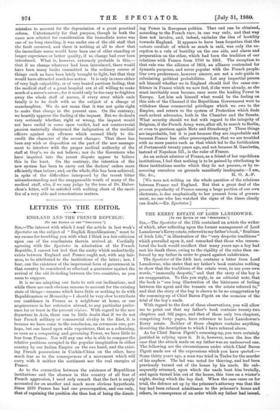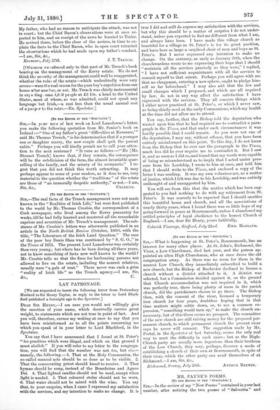THE KERRY ESTATE OF LORD LANSDOWNE.
LTO TER EDITOR OF TER SPECTATOR.")
Sia,—The Spectator of the 17th contained an article the writer of which, after reflecting upon the former management of Lord. Lansdowne's Kerry estate, referred to my father's book," Realities of Irish Life," in illustration of the "very despotic traditions" which prevailed upon it, and remarked that those who remem- bered the book would recollect that many years ago a boy had met his death there, owing to the rigidity of the rules then en- forced by my father in order to guard against subdivision.
The Spectator of the 24th inst. contains a letter from Lord Lansdowne, who states that my father's book contains nothing- to show that the traditions of the estate were, to use your own words, "immorally despotic," and that the story of the boy is an exaggeration. To this you reply, in an editorial note, that the book is "one long illustration of the bitterness of feeling between the agent and the tenants on the estate referred to," and that the story of the by is shown to be no exaggeration by the summing-up of Chief Baron Pigott on the occasion of the trial of the boy's uncle.
With regard to the first of these observations, you will allow me to point out that my father's book contains twenty-two. chapters and 362 pages, and that of these only two chapters, comprising forty pages, have reference to Lord Lansdowne's. Kerry estate. Neither of those chapters contains anything deserving the description to which I have referred above.
As for Chief Baron Pigott's summing-up, you were certainly justified in relying upon it. It is, however, none the less the case that the attack made on my father was an undeserved one. The following are the circumstances under which Chief Baron Pigott made use of the expressions which you have quoted :- Some thirty years ago, a man was tried in Tralee for the murder of his nephew. The lad was noted for thieving, and had been previously turned out of the house by his uncle. He sub- sequently returned, upon which the uncle beat him brutally, and again turned him out of the house, this time on a winter's night, during which the boy died. When the case came on for trial, the defence set up by the prisoner's attorney was that the- boy had been refused admittance to the prisoner's house and. others, in consequence of an order which my father had issued..
My father, who had no reason to anticipate the attack, was not in court; but the Chief Baron's observations were at once re- ported to him, and on receipt of the news he hurried to Tralee. He arrived there, before the close of the assizes, in time to ex- plain the facts to the Chief Baron, who in open court retracted the observations which he had made upon my father's conduct. —I am, Sir, &a,
[Of course, we ieferred only to that part of Mr. Trench's book bearing on the management of the Kerry estate. We do not think the severity of the management could well be exaggerated, whether the rules of the estate—which undoubtedly were very severe—were the real reason for the poor boy's expulsion from one house after another, or not. Mr. Trench was chiefly instrumental in exp.ting ome 4,6)0 people at £3 10s. a head to the United States, most of whom, as was admitted, could not speak any language but Irish,—a cost less than the usual annual cost .of a pauper to the rates.—En. Spectator.]



































 Previous page
Previous page